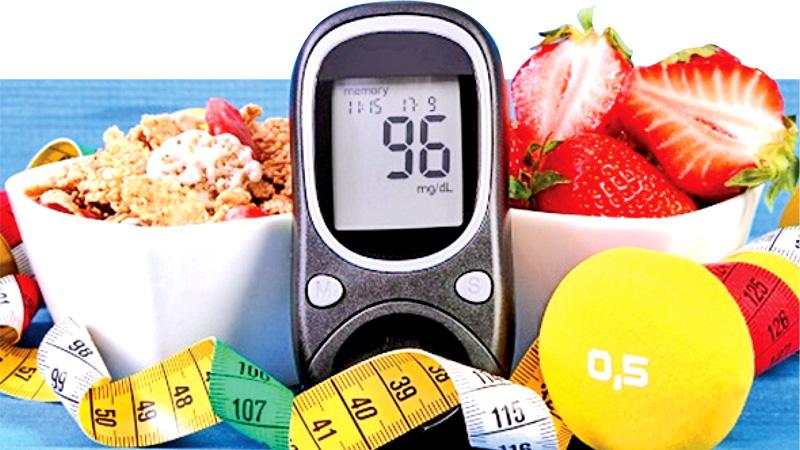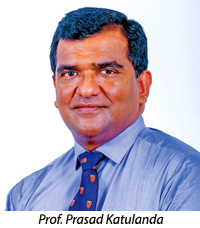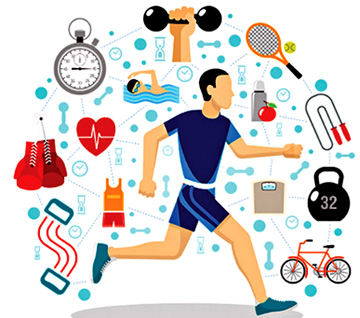
Diabetes has often been referred to as the Mother of All Diseases as if affects almost every part of the human body if left untreated and uncontrolled.
Today being World Diabetes Day, the Sunday Observer spoke to Senior Lecturer and Head, Department of Clinical Medicine, University of Colombo, Consultant Endocrinologist and Diabetologist, National Hospital of Sri Lanka, President, Colombo Medical School Alumni Association (COMSAA), Vidya Jyothi Prof. Prasad Katulanda to give us more insights into how diabetes affects us and how it can be prevented.
Excerpts
 Q: Diabetes is still widely prevalent worldwide including Sri Lanka. While ongoing efforts by medical authorities to halt its spread have reportedly led to a decrease in numbers, how would you rank diabetes in Sri Lanka today?
Q: Diabetes is still widely prevalent worldwide including Sri Lanka. While ongoing efforts by medical authorities to halt its spread have reportedly led to a decrease in numbers, how would you rank diabetes in Sri Lanka today?
A: Although the medical fraternity and the health authorities are battling the diabetes epidemic, the numbers are going up as the lifestyle changes which are largely responsible for the diabetes epidemic are not reversing. According to the latest studies done in the Colombo District, about one-third of adult population has diabetes. Another one-third has pre-diabetes. Only one-third has normal blood glucose. This may be slightly different in less urban areas. But in other urbanised districts, the situation may be quite similar. In less urbanised areas, the prevalence would be lower than in the Colombo District.
Q: What is the last study done islandwide on the incidence of diabetes?
A: The last study at the national level is quite old. A study done in the Western Province called the Sri Lanka Non-Communicable Disease Survey showed the figures I have mentioned above. We urgently need a national level diabetes study.
Q: According to the studies, which districts have the highest incidence of diabetes, and why?
A: The highest incidence is in the Colombo District. This is because the people are more obese and sedentary due to higher income and the increased level of urbanisation leading to overcrowding. All these factors have collectively contributed to an increased level of use of sugar, high calorie foods and people leading more sedentary lives.
Q: Age-wise and gender –wise, who are most at risk of getting diabetes?
A: The older age groups may have higher numbers since there are many in such age groups who had got diabetes many years ago. However, the middle-aged people are more at risk of getting diabetes as they are more obese.
Q: How do you categorise those who haven’t got the disease, but are at risk of developing? Pre-diabetics?
A: People with intermediate levels of blood glucose (Fasting between 100 – 126mg/dl and after a meal or glucose test between 140 – 200mg/dl) are considered to have pre-diabetes. They are more at risk of diabetes than normal people. However, those who have risk factors such as family history, obesity, sedentary lifestyles, less sleep, as well as other risk factors may also be at risk although they may not have got pre-diabetes at present.
Q: What about pregnant women?
A: Women who develop pregnancy associated diabetes are at high risk of developing diabetes later.
 Q: In a previous interview with us, you said that 50 percent of persons don’t even know they have the disease until it has progressed to an advanced stage. According to your present experience at the NHSL, have these figures come down in recent years?
Q: In a previous interview with us, you said that 50 percent of persons don’t even know they have the disease until it has progressed to an advanced stage. According to your present experience at the NHSL, have these figures come down in recent years?
A: In Sri Lanka, people with undiagnosed diabetes have slightly come down compared to other countries due to increased awareness of diabetes and due to increased facilities to check for diabetes.
Q: Diabetes has often been called the Mother of all Diseases. Why? What happens to the body when you get diabetes?
A: Diabetes affects many other organ systems in the body. Uncontrolled diabetes damages the small blood vessels (microvascular complications) in the eyes (retinopathy), kidneys (nephropathy) and the nerves (neuropathy). These complications can lead to blindness, kidney failure and nerve dysfunction. There are multiple issues due to nerve dysfunction. Since you may lose sensation in your feet, you may get injuries without your knowledge which even results in amputation of legs. The autonomic nerve dysfunction can cause faintness, vomiting, diarrhoea and erectile dysfunction.
Q: What are the early signs of diabetes to look out for?
A: Many people with diabetes may not have any symptoms during early stages. That is why sometimes we call it a ‘silent killer’. When blood glucose levels start rising, you will start to feel dizzy, weak and sleepy. You may develop symptoms of diabetes such as increasing thirst, needing to pass a lot of urine and weight loss. Some people may also get wound infections, boils and fungal infections in the genital organs and areas.
Q: If not treated early how long will it take for the disease to progress? Are there different stages of progression?
A: If not controlled properly, patients with type 2 diabetes will start getting microvascular complications after more than about five years. However, if the disease had been undiagnosed for several years, patients may present these complications even at the time of diagnosis. The process of cholesterol building inside blood vessels which is called atherosclerosis that ultimately leads to heart disease, stroke and peripheral vascular disease, starts quite early in patients with diabetes even at the stages of pre-diabetes. In patients with type 2 diabetes, this is different and complications in poorly controlled patients start about 10 years after the diagnosis.
Q: The Government has decided to give high priority to Non Communicable Diseases (NCDs). How will this affect pre-diabetics and those already with the disease?
A: The Government is making progress in diabetes care over the last decade with the setting up of Non-Communicable Disease Unit and the Non-Communicable Disease Bureau. While this will improve care of patients with diabetes, more aggressive efforts on prevention at national level are needed to stem the tide.
Q: Why?
A: Prevention of diabetes and other Non Communicable Diseases (NCDs) is much more important than treatment. This is because treating diabetes and other NCDs as well as their complications are costly and a huge burden to the country and society.
Q: How do you propose they should set about this task?
A: There are many ways this can be done using resources as prevention of diabetes and NCDs needs to be done through a comprehensive, integrated and multisectoral program. Awareness raising among children on prevention should start in the schools. The Health Ministry in collaboration with the Media Ministry should launch a public education program. Such a program should get the support of all professional bodies, media sector NGOs and the civil society. Support of all sectors including the agricultural and food industry should be sought to make available more healthy food options and discourage promotion and use of unhealthy foods. Town planning, local government bodies and sports sector should be involved in promoting physical activities and making healthy environments conducive for physical activity and sports.
Q: Spell out some of the most important rules they should follow?
A: All people should eat healthy meals controlling carbohydrates and calories to suit their level of physical activity and to prevent obesity. Green vegetables and green fruits should be encouraged in the meals. Everyone should undertake some form of physical activity. Adults on average should have minimum of 150 minutes of aerobic physical activity spread over 3 to 5 days. Children should have at least one hour of physical activity per day. People need to maintain a healthy BMI (preferably less than 23) and an ideal waistline (men less than 90cm and women less than 80cm).
Q: What part do healthy diets help in reducing diabetes risks?
A: Diets less in sugar and carbohydrates, and high in green vegetables, green fruits, with some amount of nuts and fish have been shown to reduce diabetes risk.
Q: Is there an age limit for following these rules?
A: There is no age limits for a healthy lifestyle. This should start from child hood and should follow till we die to be free of diabetes and NCDs.
Q: As we are now in the midst of a Covid-19 pandemic with threats of new variants entering the country, how vulnerable are diabetics with lowered immune systems to these viruses?
A: People with diabetes and NCDs are not vulnerable to get Covid-19 infection compared to those without these co-morbidities. However, those with diabetes and NCDs are at higher risk of death and complications if they get Covid-19 infection.
Q: In most cases, diabetes is detected with the use of a glucometer. How does this machine work and how accurate is the reading?
A: Glucometers are usually used to monitor blood glucose control. A small drop of capillary blood is used in this method. In the test strip, a chemical reaction takes place when the blood drop is applied, and this is detected by the glucometer. However, glucometers are not recommended for diagnostic purpose. For diagnosis, a formal laboratory test for blood glucose or glycosylated haemoglobin is generally recommended.
Q: What is the best time to get this test?
A: Glucometer testing times should depend on for what purpose this is used. Usually, early morning before bed tea and before meals would give an idea of overall blood glucose control. If there is a need for more stringent control like in pregnancy, we need to do both before and after meals. If it is needed to detect high or low blood glucose, blood glucose needs to be checked at such an instance.
Q: Some physicians recommend getting an HbA1c Report.? What is it?
A: HBA1C or glycacosylated haemoglobin is a test that gives an idea of the average blood glucose over a period of the preceding three months. It was initially used to determine overall blood glucose control. However, now it is used as a diagnostic test.
Q: Some important Do’s and Don’t’s to follow for healthy diabetes free life styles?
A: Cut down on sugar, sugar added beverages and sweets. Limit carbohydrates, especially refined carbs to maintain healthy weight, especially if you are a person involved with a job that does not involve much physical activity. Increase consumption of green vegetables and green fruits. Engage in regular physical activity. Stop smoking. Limit alcohol if you are using or don’t start if you don’t use and sleep at least six hours or more daily.
Q: Your message to the public?
A: If you have symptoms of diabetes, immediately check your blood glucose levels. It is a good habit to check blood glucose at least once a year if you are above 35 years and at an even younger age, especially if there is a history of young onset diabetes in the family.
